Tom Kepler's Blog, page 22
November 8, 2013
Quality of Life and Security

In my current hometown in southeast Iowa, there are, of course, issues such as security, poverty, crime, drugs and alcoholism, and being homeless.
It's just not so obvious, though. And, I have to believe, not so widespread.
The above photo is a house I rode by on my bicycle here during my visit in California. It's in a section of town that would probably be called "the tougher part," and it's also on a major transit road in town. The house's "security" gives insight to both the town and to the home's owner. For me, it exudes the sense of being besieged, and I find that depressing (as I'm sure the home's owner does).
During my six-month stay in California, in my early-morning bike rides I've grown used to seeing the homeless sleeping on the blacktop in commercial parking lots. Around dawn, individuals can be seen coming out of the woodsy fields where they slept for the night. I regularly see people pushing prams, grocery carts, and pulling wagons loaded with their possessions. Quite a lot of people ride bicycles, and it is evident from their clothes--and the fact that they're smoking a cigarette--they aren't bicycling for their health. I got hit up for spare change so often that I began to automatically initiate deflecting behaviors.
This is not to say many of these issues in Iowa are not present. There is a great deal of poverty in southeast Iowa. School free lunch programs are federal gauges for poverty-stricken areas, and southeast Iowa is right up there with some of the big cities. Poverty is more hidden, though, finding its place on gravel roads or on the sofas and spare rooms of family and friends. The weather in Iowa is too unforgiving to support large groups of homeless living in camps in the woods.
Just yesterday I was walking in shorts and tee shirt. Sure, the morning are nippy now, but I guess "nippy" is a relative term. Nippy in Iowa probably starts with frost, although we all love to complain. "Nippy" here is the Central Valley of California probably is around 50 degrees.
At the mobile home park where my parents live, twice the mailboxes have been raided by two different groups stealing mail. (Both "rings" were busted due to the benefits of security video cameras.) The sheriff department regularly cruises the park, and the other night they came with flashing lights for a disturbance.
A major homeless camp near the Feather River was raided by law enforcement over the summer, providing an opportunity for the county to help those individuals with drug and mental issues to have more support. That was how one officer phrased the purpose of the raid. The on-going challenge of dealing with the homeless, and the size of the local homeless population, is a continuing item for discussion in the area.
Am I saying these problems are fewer in the southeast corner of Iowa. I guess I am saying that, although I caution myself that not easily seeing evidence of a problem doesn't necessarily mean it doesn't exist.
I wish the best to this area where my family lives in California. Being a native son of California, I know that often California leads the way (some would say leads "a way") in how to deal with social issues. I wish the best for the world, realizing that social health is created by having many individuals who are physically and mentally healthy, who are strong within themselves.
I'm ready to go back home, though, where I can ride my bike across town and not easily see at least 20 individuals who are living on the sharp and bitter edge of society. I feel guilt that I've stopping noticing, so that number of "20" is pretty arbitrary.
Winter's coming, and I wish each and everyone a safe haven when the dark winds reach us.
Copyright 2013 by Thomas L. Kepler, all rights reserved
Published on November 08, 2013 08:00
November 4, 2013
A Day Out with Mom #22: cycles
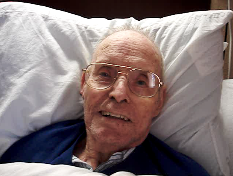 Today was a good day with Dad. It followed a bad day, and the day before that was just okay. Cycles . . .
Today was a good day with Dad. It followed a bad day, and the day before that was just okay. Cycles . . .The trick is not to feel the cycles can be changed. Rather, we have to recognize where in the cycle we are and deal with it. A bad day? Re-direct Dad's attention, and if the feeling becomes too intensely aggressive, leave early. An okay day? Enjoy the good moments and cut the visit short so fatigue won't turn the visit ugly. A good day? Enjoy, provide honest information, and keep a close eye to Dad's energy level.
"I can't see all that well, and I'm not strong enough to take care of you."
"The pneumonia knocked you back, and it wouldn't be safe to have you come home now."
"Your memory's not so good now. You forget a lot."
"A lot of people ninety-three years old can't take care of themselves."
Dad even comes up with statements like this himself. "Ninety-three's pretty old."
The process now is to recognize the particular part of the cycle and then to work with the reality of the day, whether it's a rant, sleep, memory loss, or intelligent conversation. Then, of course, all may be experienced within an hour's visit.
Mom is still grieving the loss of the cycle in her life when she lived with Dad rather than conducted visits. She--through repetition--is getting better at telling Dad she can't take care of him.
The sons are better at re-directing: "Oh, we can't ask the doctor to take you home today. It's the weekend, and decisions like that aren't made on the weekends," which works well until his roommate says, "Oh, I went home once on a weekend."
I've gotten used to making strong statements. "Dad will never come home." " You have to care for him like a nurse first and like a wife next." "He just wants what he wants, like a child."
We can always hope but must act on realistic assessment.
The result of six months of caregiving, paperwork, and teaching is that I am coming home back to Iowa. I'll be back to see Mom, Dad, and my brother in six weeks or so if all goes well, but my efforts to create a sustainable environment are at this time successful.
I've been the best son and brother I could be. Now I'll go home and be the best husband, father, and grandfather I can be. And somewhere in all this, I'll also try to be good to myself.
Copyright 2013 by Thomas L. Kepler, all rights reserved
Published on November 04, 2013 13:55
October 22, 2013
My Books for a Penny--Well, at Least One
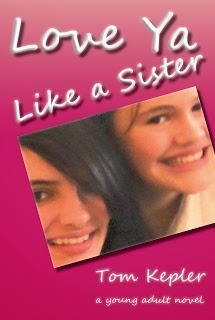 Here's the sequence . . . A recent post from the writing blog Indies Unlimited was about Amazon's Author Central pages, advising me to check to make sure all my books were listed. Yes, check!
Here's the sequence . . . A recent post from the writing blog Indies Unlimited was about Amazon's Author Central pages, advising me to check to make sure all my books were listed. Yes, check!I then just browsed my books a bit to make sure everything looked right. Yes, check!
Then I noticed that my second published book, the novel Love Ya Like a Sister , could be bought used for one penny. In fact, nine distributors have it available for one penny. Hmmmm . . .
I wonder if that's one copy nine used dealers have access to, or if it's nine copies nine dealers have access to.
All my other books available in paper are priced above one cent, even for the used copies. Is it because young adult novels lose value more quickly? Is it because I marketed that novel more aggressively and more copies are available? Is it because more readers consider it a one-time read?
Who knows?
I just thought I'd get my two cents in regarding my one-cent books.
Copyright 2013 by Thomas L. Kepler, all rights reserved
Published on October 22, 2013 10:38
October 7, 2013
A Day Out with Mom #21: making potato salad
 "Three ninety-nine for that?" Mom exclaims. "That's too much!"
"Three ninety-nine for that?" Mom exclaims. "That's too much!""Then let's buy some potatoes and make our own. It'll be fun."
We buy a three-pound bag of russets for $3.68--eight potatoes.
"How many should we cook, Mom? Five?"
"I'd say six. I usually made more when I could do such things by myself."
"I need to wash the spuds."
"After I finish the lunch dishes."
I sit and read for a bit. Washing a few dishes is something Mom likes to do because her poor hearing and eyesight don't get in the way. I wash up the pots and pans and leave a few for her. I suspect that when I'm not looking she re-washes some of the cookware, though. "When you stop doing, that's when you get yourself in trouble," she says.
"Want me to peel for you?" Mom asks.
"That's OK. I'm good at peeling potatoes." When my first wife was receiving radiation therapy, the only thing she could easily eat for some time was mashed potatoes. I peeled a lot of spuds.
I peel the potatoes and put them to cooking.
"Oh! We need hard-boiled eggs," Mom says.
"Already boiled them, Mom, and have them in cold water."
"Here, you can chop the onions and pickles while the potatoes boil. Save yourself some time."
"Good idea, Mom."
I dice the onions and pickles. "You think the potatoes are done? Here's a fork to poke them with."
"A little bit longer."
"OK, I'll go four more minutes. That'll make twenty minutes." I dice the two eggs.
"Do you put the potatoes in cold water? You know better than me. I've made more macaroni salad than potato salad."
"No, just drain them. Yes, I have made a lot of potato salad. Macaroni salad is easier."
I drain the potatoes and then transfer them to a cool pot. Mom peers into the pot and then feels with her hand.
"I'm letting them cool some before putting them in the frig."
"Oh, just put them in! We can't wait all afternoon. It'll be night before we're done."
In they go, and then later Mom has them out, cubing the potatoes. "It's getting late. Almost two o'clock. They're warm, but that's OK."
She cubes them by touch and then hands me the bowl. "You can mix. You'll need two spoons." I take that to mean I'm not to use my hands for mixing.
I mix the mayonnaise, mustard, and diced ingredients, add some salt and pepper, a little milk to moisten.
"How's this taste, Mom?"
"Add some ranch dressing to spice it up a little."
A little goes in, less than she'd use, I'm sure, but I want to eat some, too. "How's that taste?"
"Better. OK, put it in the frig to cool."
Dinner for Mom: steamed broccoli, potato salad, and a hotdog and bun.
"You make a great potato salad, Mom.
"I didn't make it--you did. I just cubed the potatoes."
"All I did was what you told me to do. That makes it your potato salad."
"Oh, I don't know about that," Mom says, but she's smiling.
Copyright 2013 by Thomas L. Kepler, all rights reserved
Published on October 07, 2013 04:00
September 10, 2013
A Day Out with Mom #20: 4 visits
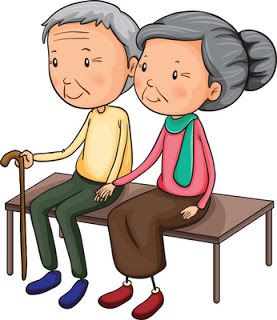 Visit 1
Visit 1Dad is lying on his bed, dress including a warm-up jacket and trucking cap. He looks up as we enter and I pull up a chair to bedside for Mom. I sit against the wall, behind Mom and mostly out of sight.
Mom and Dad talk quietly, she answering questions regarding where she lives now, how the car is running, and how are financial affairs. The discussion is more that of reminding Dad of the basics; there are no detailed explanations.
"When can I go home with you?" Dad asks, and Mom explains that he is weak and she can't take care of him. He will have to stay for a while longer. Dad raises no argument.
After a half hour, Dad begins to get more agitated, saying he wants to go home. Mom kisses him and says she has to go and will come back later. We leave before things are too tense, no one really happy but no overwhelming moments either.
Visit 2
"Hello, connect me with the nurses' station, please."
"Yes? This is the nurses' station."
"Hi, this is Tom Kepler. I'm calling to see if this is a good time for my mom and me to visit Harold. Is he in a good mood today?"
After a check comes the reply, "Today would not be a good day. He's looking to leave and has 'that look' about him."
"OK, thank you. We'll try again tomorrow."
Visit 3
Dad is sleeping when we enter his room. Mom approaches and gently wakes him.
"Hello, Harold. We came to visit. How are you?" She touches his arm lightly and they kiss.
"Glad you could come," Dad says.
"Do you want to talk, or are you sleepy?"
"I'm pretty sleepy."
"You'd like us to let you sleep?"
"I think so, but thanks for coming."
"OK, you rest, and make sure you eat your lunch."
Visit 4
Dad is lying in bed awake, fully dressed with cap, covered by a blanket. He stares at the ceiling.
As we enter, he looks at us. "Hi, I was wondering if you'd forgotten about me."
"Oh, we love you, Harold. We would never forget you."
Mom sits in her chair, and I move to the chair by the wall behind her.
They talk, and Dad has more energy today and is more lucid. There is no real focus to the conversation, but they are together for about ninety minutes. About every 7 minutes on the average, Dad asks where we live now, but there is more ease to the questions. He nods as Mom verifies our location.
I join the conversation later on, sitting on the edge of Dad's bed. At several points, we remind him that the "old place" is not where we live, that he sold it over fifty years ago, and that my brother is not "Steve," a high school friend. Dad ponders these facts that he had wrong.
"You lie here and just think and dream. I'm not sure what's real anymore."
The conversation is sweet, though, and lasts until the aide comes to get Dad up for lunch. We say our good-byes, promise to be back, and ease out the door as the aide helps Dad into his wheelchair.
Mom is happy, having talked to Dad and left with a warm good-bye.
"I'd like him to come home, though, if he gets stronger and my heart gets better."
That's a wish worth having. I agree, Mom taking my arm as we slowly make our way outside and into the light of day.
Copyright 2013 by Thomas L. Kepler, all rights reserved
Published on September 10, 2013 04:00
September 3, 2013
I Take a Gamble . . . and Lose
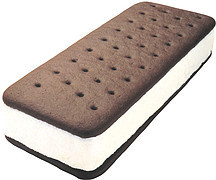 So I'm in a mom-and-pop convenience store across from the post office, having just ridden my bicycle to mail a letter. It's an August afternoon and HOT, so I'm using that as a good excuse to buy an ice cream sandwich.
So I'm in a mom-and-pop convenience store across from the post office, having just ridden my bicycle to mail a letter. It's an August afternoon and HOT, so I'm using that as a good excuse to buy an ice cream sandwich.Above the cash register, colorful rainbows of ads slap my face--buy a Lotto ticket! This time, I do just that. Once about every 5-8 years, I buy a lottery ticket in order to feel the hot juice of maybe-I'll-win-what-will-I-do-with-all-that-money adrenaline rush through my body.
I go home and carefully read the ticket stub because I've forgotten how to determine my winning status, it's been so long.
It's Wednesday, and I find I have to wait until Friday, 7:30 PM.
Friday evening arrives and departs, and I've missed the Lotto train, my attention on other things. However, sometime between midnight and 2 AM, I awake to the realization that I may be a multi-millionaire--worth 77 million. Rainbows of colorful exclamation points arch above me, a corona of anticipation.
I go online to the website, check out my particular mega-game . . . and, you guessed it, haven't won a damn thing. Not even one number matching!
How can that be?
My reaction is the same as in my foggy remembrance of years past : indignation. What do you mean I don't have a winning ticket? Do you think I buy these tickets to lose? Why would you expect me to keep buying tickets if I don't win? Do you think I'm an idiot?
("Don't answer that last question," my mind whispers to me.)
Most likely, though, in another 5-8 years I'll buy another ticket and take my chances. It's the gambler in me. I'm Mr. Lucky--blessed with wife and family, career, health, joy. Someone just needs to notify the gambling commission--I'm a winner, so spread the icing on the celebration cake.
Copyright 2013 by Thomas L. Kepler, all rights reserved
Published on September 03, 2013 04:00
August 31, 2013
A Day Out with Mom #19: engagement and marriage
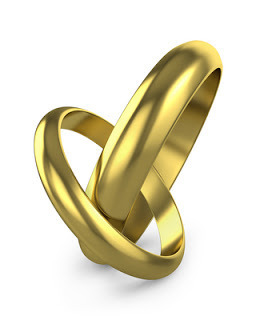 I met your dad at a dance at Robinson's Corners. He came with your uncle, who was about sixteen then. Your dad was just out of the service.
I met your dad at a dance at Robinson's Corners. He came with your uncle, who was about sixteen then. Your dad was just out of the service. We danced a few dances, and he came over to my parents' place later to see me . I was working at the county hospital then. Finally he told me that he wanted to marry me but had been married before. I talked to my mom about it, and Mom said, "I don't know if I want you getting mixed up with anything like that."
I'd fallen in love with him, though, so on Thanksgiving I went to meet his mom and dad. I guess I made an okay impression because we decided to marry. We were engaged for a year. During that year we planned and saved for our start together.
We married in my church, the First Christian Church. Your dad's family, as you know, are Methodists. I had eight bride's maids. It was common then to have that, and I also didn't want to show preferences to any of the nurses I worked with. I didn't want to hurt anybody's feelings.
I weighed ninety-eight pounds the day I was married. Your dad and I never did anything before we were married. My momma would have killed me if I did, and I didn't do that kind of thing anyway.
We rented a little cottage from a bookkeeper at the hospital, Sophie. She was alone and had a little place behind her house. We drive by that spot now when we go to the drugstore. You know the place? She had the shakes from an accident when she visited her sister up in the mountains. A buck during rutting season charged her and hit her really hard, and there must have been nerve damage or something. Your dad and I were like her kids. I think we paid twenty-three dollars a month for rent.
The whole family got together to fix the place up. My Aunt May helped with the floor and the curtains. We didn't have much money, so we had paper curtains from World War II that had been used to save cloth for the war. Dad and my brother and I painted. Even Dad's sister Helen came over to help.
We traveled around in Lake County on our honeymoon, and my dad stayed at our place to make sure nothing was stolen. We'd saved our money and had a new sofa and chair. It was a clean place and so pretty--our first home. Dad would help Sophie, too, sometimes because she was all alone.
Somewhere Dad had gotten a big tent that he set up to use as a garage. Inside that tent he had a Ford coupe convertible he was fixing up. He took it all apart, cleaned it, and then put it back together. Piece by piece he'd work, and I'd sit and watch him. He painted it beautiful creme and green colors.
Your Aunt Helen would bring over Laurie, and the girls would play together. Those were the wonderful days of our marriage when we were young and so full of life. Our parents were alive and healthy. We were young and in love. We had a little baby. When your sister was a year old, I dressed her in pink and took her to the hospital. The nurses all passed her around. I remember the head nurse who was so strict. She just tucked your sister in her arm, and I thought she'd never give her back. Chenel just jabbered and jabbered her baby talk. She was such a happy child.
Your dad and I have been married sixty-seven years now. All those good years. I can't really even say any of them were bad, even though there were rough times we had to go through. Your dad always had a job, though. He always brought money home and took care of me and you kids. He didn't drink. Oh, he'd have a beer sometimes but not very often. He gave up smoking in the sixties after I told him, "Smoke then if you want to die."
Love is the best thing to take care of anger. It's like your Grandmother Kepler said: I know your dad better than anyone else. He feels lost now and doesn't even know where he is. The other night he called and said, "Come and get me. I'm up here at the casino and need a ride home." He told me he doesn't like it where he is and wants to come home.
I don't think he's going to live much longer. It makes me so sad I cry and cry. That's why they told me to stop coming every day to see Harold. They say it won't do your dad any good if I die first. Who knows, though? It's all in God's hands. God gave us many good and wonderful years together. There's been more good than bad, and I'm happy for every day I have left with your dad, however many they may be.
Copyright 2013 by Thomas L. Kepler, all rights reserved
Published on August 31, 2013 04:00
August 29, 2013
A Day Out with Mom #18: anger and demons
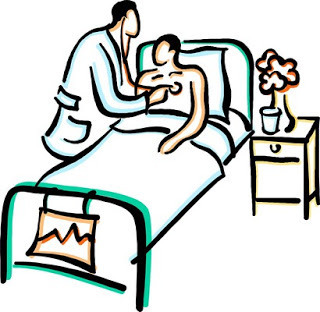 "You take care of my son," your grandmother said to me when I married your dad. And then years later she told me, "I think you're the only one who really understands Harold." I think she was right. Your dad wasn't an easy man to understand. He had his demons, you could say.
"You take care of my son," your grandmother said to me when I married your dad. And then years later she told me, "I think you're the only one who really understands Harold." I think she was right. Your dad wasn't an easy man to understand. He had his demons, you could say. When he was in the airplane wreck in Alaska, he was in a body cast for over a year. He worked with checking out the instruments in the planes, and he was doing that with some Russian women pilots. They spoke no English. They wrecked the plane and threw Dad all over the inside, up and down. He's never liked being kept down ever since. I think that's why he rips his IV's out when he's in the hospital. That's why he fights with the nurses and doctors to get out. That's why he has unhappy times in the rest home.
Once when you were little, he had terrible pain in his back and went to the VA hospital to see about it. I don't know what happened, but he didn't get help. He came home so angry that he took his uniform and dogtags, put them in a pile and burned them. Then he took the ashes and the tags and buttons and threw all that away. Later, he was mad at me and said I'd given his dogtags to you kids and we'd lost them. I had to tell him about what he'd done. He didn't even remember. He'd have spells, and I was glad when we got our first TV because he could sit and relax.
Yes, he's had this great anger his whole life. You didn't see it so much because you were quiet and wouldn't argue. And you read. It isn't easy to argue with someone who's got his nose stuck in a book. Your aunt once told me, "My dad was a good father and teacher, but he was never very nice to Harold." When your dad was little and learning his times tables, your grandpa would slap him on the back if he got it wrong. He was a hard man sometimes. Grandma was quiet like me but when your grandpa and dad and his brother got going, she'd just say, "All right, I've had enough. You all just stop this right now," and they would.
I had to do the same thing with your dad early on. I told him, "I won't live like this, and if you can't control your temper, you'll just have to go somewhere else. I'm not going to be married and live like this." He learned that he might be angry about other people and things, but he couldn't bring that anger home. Oh, he'd complain and talk about it, but he wouldn't be angry to us because of other things. That's how I'd work with your dad, especially when you kids were young.
I remember, though, when you were sixteen and went to that party your job had at the lake--with the boss's son who bought a keg! You came home drunk and went to your room. Your Uncle Harry and Dad and I were in the patio talking when you came home. Dad went in to see how things had gone and realized you were drunk. He said something, and you screamed and hollered and told him off. Dad didn't know what to do, you were always so quiet, so we decided to let you sleep it off. You were home safe, anyway. Thank God for that! I remember my brother trying not to smile and then saying he'd better be going. I bet he laughed all the way home, and you were sick like a dog the next day, its own punishment.
Your brother and sister didn't have it so easy, though. Your sister was a lot like your father. She'd argue with him and they'd go round and round. That's why she quit high school in the last half of her senior year. She wasn't going to take it anymore, she said. It was both their fault. They just couldn't get along until many years later. We helped her, though, and loved her.
Pat was quiet and didn't like to argue. He'd take it all inside. Your sister would tell your brother when he was little, "Now, talk and I'll give you some food." He'd just look at her and not say a word. Once Pat told me that at a Little League game he made an error. Dad told him, "You lost us the game." Pat just went home and ran down to the corner of our lot where you boys had made a little fort. He stayed there for a long time. I never knew that for many years. I don't know why your dad said that or did the things he did. He was a loving man who did so much for you kids--took you camping, coached Little League, helped with Cub Scouts. He had these spells his whole life. Sometimes we're in control, sometimes not as much as we'd like, looking back later. Your grandpa was like that some, too--high-spirited, you might say.
He did things I didn't agree with--come home with a new car or something. I never said anything, though. My job was to take care of the house and you kids--and Dad. I did that, and Dad always gave me what I needed, no matter how hard he had to work or how many jobs he had to have.
When we were married and had your sister, the hospital would call and ask me to work. They wanted me to work three days a week. Your dad was gone on the road, though, driving truck. My parents would come down from Greenville to stay with me, especially when I had all three of you. Your Grandma Kepler told me, "You've got three children, Betty. You let Harold take care of the money. You've got enough to do."
Your dad would change jobs pretty often. He'd get mad at something, say someone wasn't being fair, and up and leave. He could always get a job as a mechanic because he was so good. All the shops also knew that he'd bring his own customers with him, people who would only let Harold work on their cars. I think that was why he was never a shop manager, something he always wanted. He had the know-how to figure out what was wrong with the car. He just couldn't get along with people that well.
He liked to go camping up in the mountains. It was quiet there, and with just us it was easy and relaxing. I think that's why he's so angry now--too many people. And when you get old and tired, things you could hide or hold back when you were younger just slip out. It's like you're too slow to stop them.
You'd better watch out! I'm going to be ninety in a little over a year, you know. Dad's doctor says that when you hit ninety, you might say and do anything. I feel sorry for your dad, but there were some things that he never could take. I helped him all these years, and now he has to do some things on his own, just when it's hardest for him to do.
That's not fair. I think and think about how to fix it, but I can't think of anything to do. It's just the way it is. Sometimes life is like that.
Copyright 2013 by Thomas L. Kepler, all rights reserved
Published on August 29, 2013 04:00
August 27, 2013
A Day Out with Mom #17: games with Dad and the guys
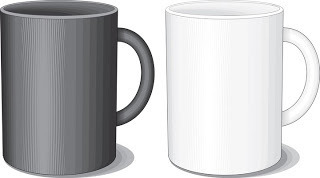 Six miles to visit my father was my morning bike ride today. Dad was sitting in the dining room waiting for breakfast and drinking coffee with two other men.
Six miles to visit my father was my morning bike ride today. Dad was sitting in the dining room waiting for breakfast and drinking coffee with two other men."Hi, Dad," I say and introduce myself to the men, Ralph and Glen. There is small talk from the men and not much talk from Dad, but he nods at appropriate times, indicating that he's following along.
I see on a bookshelf a game my students sometimes play that involves stacking blocks of wood that look like little railroad ties. I get the game and sit down, taking out the pieces of wood. First I line some up and then knock them over like dominoes. The men watch as I explain how the kids play with the pieces.
"What age you teach?" Glen asks.
"Grades seven to twelve."
"And twelfth graders do this?"
"They'll do anything if it means they don't have to work." All the men knowingly nod--remembering, I'm sure.
I stack the wood up to play the basic game: four one way side by side and then four the next way, back and forth in a rising stack. The object is to remove a piece on a lower stack, placing it on top. I begin the game and then invite the men to try it.
"I'm too shaky," says Ralph. "I'd knock them over."
"They always eventually fall," I say, "especially when there's a bunch of students stomping around on the floor." A few smiles at the thought of so much energy.
I remove and stack while the men watch. During the conversation I share why I'm here with my parents, that I'm from Iowa and have been here for four months and have two more before I can return home.
"A lot of families wouldn't do that," Ralph says.
"Well, my parents helped me when I was young, and now I'm helping them." Dad smiles and nods.
"Count those tiers," Ralph says.
"Twenty-three," I say, "and they're all each of two pieces. I can't do anymore unless I have a stack of just one."
I try this, and--lo and behold--I do it, balance a portion of the stack on just one piece. Trying for a second, the stack falls. We all laugh, and I clean up.
"Now, be sure to act like you can do this all the time," Glen says.
"I'll be sure to try some other day so that you'll all see today was just dumb luck to stack them so high."
I put the game away and then return. Breakfast is being served.
"I've got to go buy some bread and jam now. I enjoyed meeting you all," I say to the men. "I enjoyed today," I say to Dad.
"Thanks for coming," Dad says, and I leave. I don't know if Dad will remember my coming even fifteen minutes after the time I leave. I'll remember, though. It was a good day, and it warmed my heart to see my dad with a peaceful smile on his face.
Copyright 2013 by Thomas L. Kepler, all rights reserved
Published on August 27, 2013 11:34
A Day Out with Mom #16: clutching at realizations
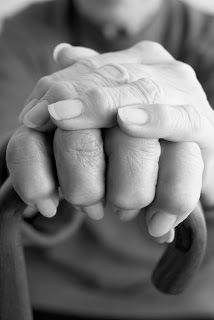 "The days are so long," my dad tells me. His eyes are red and tear-filled. His lips tremble.
"The days are so long," my dad tells me. His eyes are red and tear-filled. His lips tremble.His time with Mom and me today is a mixture of absolute clarity and confusion. He is calm, yet there is also a presence of sadness and loss that I cannot alleviate or ignore. I feel sad and guilty, helpless and yet happy that today we can share an actual conversation of content.
We continue our rocking horse conversation, the emotional content in clear focus: "All these old people sitting in their wheelchairs slumped forward, sleeping, doing nothing," and the confused intellect: "Are we still at the old place?" or as when I first saw Dad, holding the hand of an older patient, "Is this woman my wife?"
I reply, "No, Dad, that's a lady that grabs people who get too close and holds their hand. She grabbed Mom's the other day." The woman's actions make so much sense to me--touch another person, make contact.
Dad tells my mother, "I've been going all over this place trying to find you."
"I just wanted to cry," Mom tells me later, and then says, "I do cry at night, cry and cry."
"Today," I tell her, "Dad said, 'I wish I was strong enough to come home.'"
"He said that?"
"Yes. He wanted to come home but knew he was too weak. Today he knew."
This knowledge adds solace to sadness as we sit in the inner courtyard, not saying much. I trim Dad's fingernails and toenails and then shave him, this time he being unable to use his electric shaver. Mom reaches over to hug Dad, pats his hand, feels his fresh-shaven cheek and then kisses it. A little sad and a little quiet, we are together.
Dad had been quietly crying when when I first saw him this morning and he had asked me if the woman clutching his hand were Mom. He was relieved when he was told that it wasn't. He was relieved to see me, that I was there with him. Then, an aide releasing the woman's hand, Dad had helped me turn the wheelchair to take him to Mom.
There is no cure for old age. "When I was a nurse over sixty-five years ago," Mom says, "Dr. Craviotta said, 'You're born, you live, you die. That's what life is.' We have to accept that and make the most of it."
When I was a baby, my parents helped me learn to walk, guiding my first footsteps down the path. Now they teach me--one blind and using my arm for support, the other in a wheelchair--how to navigate that same path as it turns vague and overgrown. There is no path without wilderness. Sojourners all, moving and unmoving, we get along as best we can.
Copyright 2013 by Thomas L. Kepler
Published on August 27, 2013 04:00



